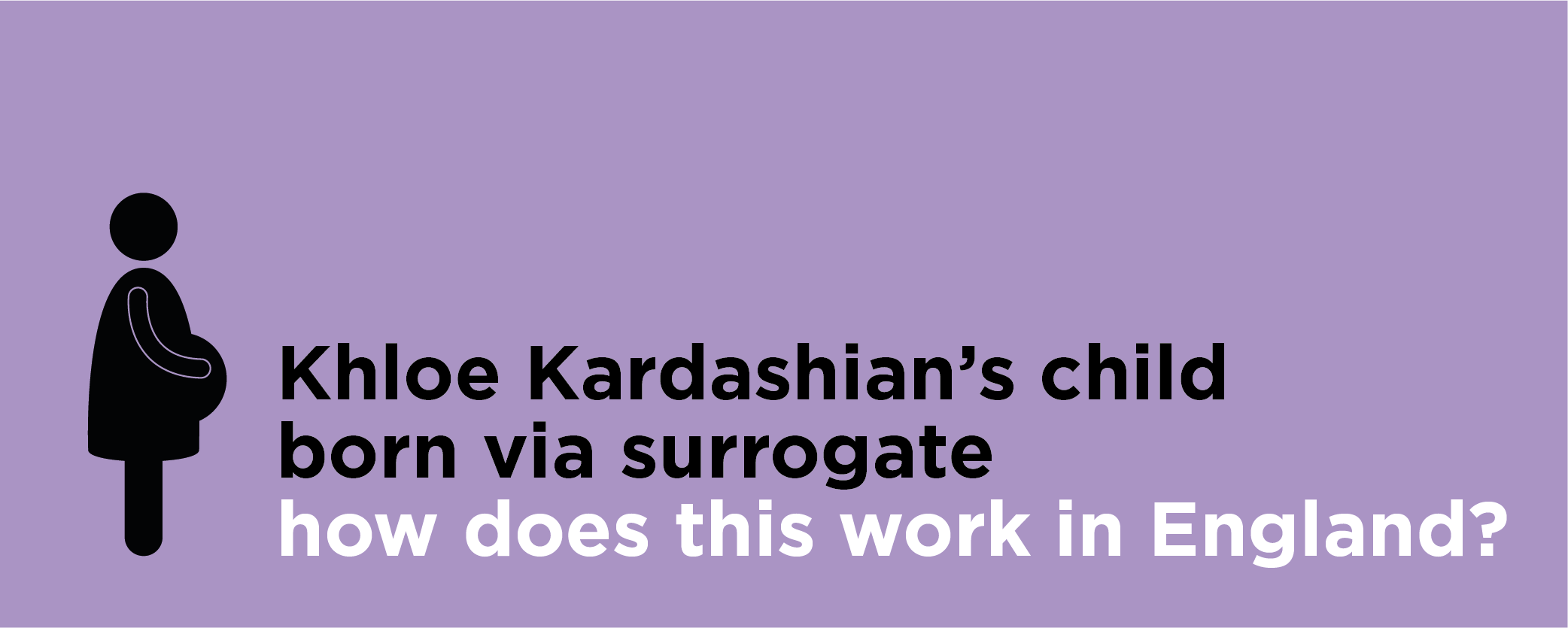- Basildon 01268244144
- Chelmsford 01245453800
- Colchester 01206217300
- London 020 4586 1280
Khloe Kardashian's child born via surrogate - how does this work in England?

- Posted
- AuthorKatherine Parker

It has recently hit the headlines that Khloe Kardashian and her ex-partner Tristan Thompson, have welcomed their second child; a baby boy who was born via a surrogate. Although Khloe and Tristan are based in the USA, it is interesting to consider some common questions about surrogacy and the law that applies to surrogacy in England and Wales.
What are the different types of surrogacy?
Surrogacy is where a woman carries and gives birth to a child on behalf of another person or couple.
There are two different types of surrogacy:
1. Straight or traditional surrogacy. This involves the surrogates own eggs being used meaning there is a biological connection between the surrogate and the child; and
2. Host of gestational surrogacy. With this type of surrogacy, the surrogate is not biologically related to the child and the eggs are either from the intended mother or a donor.
Please note that it is illegal to pay a surrogate in the UK, other than for their reasonable expenses. Commercial surrogacy is not permitted in the UK.
Do I need to enter into an agreement?
When entering into a surrogacy arrangement it is advisable to enter into a surrogacy agreement. This is sometimes referred to as a pre-birth contract. This agreement will set out how the arrangement is going to work. These are not legally binding but they are the best form of protection available to all parties entering into a surrogacy arrangement. In the event of a dispute, a surrogacy agreement can assist a court to resolve those disputes.
Who are the child’s legal parents?
When the child is born, the surrogate is automatically the child’s legal parent. No matter the biological position, the surrogate and her spouse/civil partner will be recognised as the child’s legal mother and legal father/second legal parent.
Ultimately, this legal position means that as intended parents, you will not be recognised as your child’s legal parents at birth, unless you take active steps to apply to the court for a parental order.
It is anticipated this is what Khloe and Tristan will have in place, to confirm they are to be the child’s legal parents (albeit in accordance with the laws of the relevant state of the USA).
Without a parental order or an adoption order, the surrogate remains the child’s legal parent. If this is the case, you may not have the authority to make decisions in relation to your child’s upbringing, such as what medical treatment your child may need or what school they should attend. This is the concept of Parental Responsibility.
How do I obtain a Parental Order?
The surrogate and their spouse/civil partner (who will also be the child’s legal parent), must provide their consent to a parental order. Their consent can only be provided once the child is at least 6 weeks old.
It is necessary to make an application to the court and the court will appoint a Parental Order Report. It is the role of the reporting officer to help the court determine whether a parental order is in the best interests of the child. If the court orders in favour of the intended parents, the surrogate who gestates and gives birth to the child, and their spouse/civil partner, will no longer be considered as the child’s legal parent(s). Their status as legal parents will be extinguished and parentage is reassigned to the intended parents.
Can a surrogate decide to keep the baby?
As explained above, in England and Wales, the surrogate and their spouse/civil partner will continue to be recognised as the child’s legal parents until a parental order has been obtained by the court. As a parental order requires the surrogate's consent, at any point up until a parental order is granted, the surrogate could decide to keep the baby.
What happens if the intended parents separate, like Khloe and Tristan have?
If Khloe and Tristan lived in the UK, then the fact they have separated would not necessarily impact on the surrogacy arrangement. Provided the surrogate and their spouse/civil partner still consented to the parental order, the court will be guided by the recommendations in the Parental Order Report. No doubt the reporting officer would make lots of enquiries to ensure that the best interests of the baby will be met by the order being made, notwithstanding the separation of the intended parents.
Can I enter into an international surrogacy arrangement?
Sometimes, married couples and civil partners enter into international surrogacy arrangements. This means a couple may ask someone from a different country to carry their child. The law of England and Wales can still apply to these arrangements, however, we recommend that couples obtain independent legal advice in the relevant jurisdiction before proceeding.
At Birkett Long LLP, our specialist family law solicitors can help guide those considering starting or extending their family through surrogacy. We understand it can be an exciting but challenging time for families and we aim to help make the process as smooth and straightforward as possible.
For help with surrogacy law and/or obtaining a parental order, please contact one of our specialist family lawyers who will be happy to guide you through the process. I can be contacted on katherine.parker@birkettlong.co.uk or 0330 818 3071.


Comments